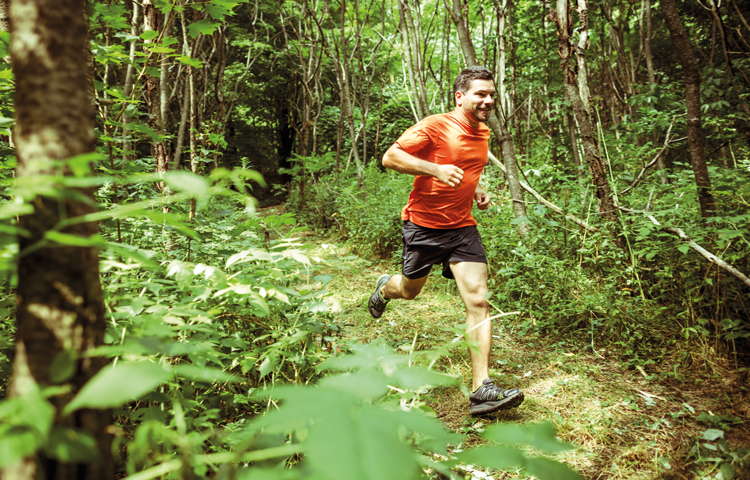
Off-road running involves more than a change of terrain; it also involves a change of mindset. The accepted rules of road running are turned upside down as trail runners define success by other metrics.
Competition
A lot of trail runners love to race instead of train, because the yardstick by which they judge themselves is different to that of their road-based brethren. While there may be
no distinction between the competitive nature of trail runners and road runners, to properly engage with trail running you may need to think about reframing what competition means to you.
In the 17th century, the age of enlightenment, the definition of competition was: ‘To strive alongside another for the attainment of something.’ According to the Cambridge English Dictionary, today’s definition is: ‘A situation in which someone is trying to win something or be more successful than someone else.’
Despite his competitive instinct, GB trail running international Damian Hall is realistically down-to-earth in his expectations: “I’m much more likely to tell myself I have to be top 10 or similar and enjoy the thrill of racing other people. In a big city race, you can overtake 100 people and there will still be 100 ahead of you. That’s no fun! I also like to try to get as muddy as humanly possible.
“Sometimes though, especially in mountainous, longer ultra-distance or especially tough races, it can be just about finishing the event and enjoying the experience.”
Time
If you’ve ever been a road runner, you might remember what it was like to be slightly obsessed with mile splits and data. But to truly enjoy the trails, you need a more flexible relationship with the ticking clock. Splits will be decided by the terrain.
Although Hall always wears his Suunto, it isn’t to check his splits. “I look at my Suunto far less frequently in a trail race and when I do it’s to see how many miles are left, not my pace, which is fairly irrelevant, as it’ll likely be much slower than my road running speed anyway. I do enjoy road running sometimes, but I hate the fact it glues my eye to my wrist as I race my watch. I prefer racing other people. Unless they beat me.”
When discussing flow, Mihály Csíkszentmihályi, author of Finding Flow, describes how all consideration of time loses its meaning. “The sense of time becomes distorted and the activity becomes an end in itself.” It’s a sensation that many trail runners will associate with.
Terrain
Road running involves the pounding of feet on concrete, which doesn’t sufficiently challenge your skill range. Natural landscapes, by contrast, offer a mosaic of horizons to stimulate your body and mind. As a result, it is much easier to focus on something external without drifting off on to autopilot.
The going underfoot dictates your shoe selection, race approach and, more importantly, your proprioceptive feedback. As each new feature rears up, the terrain provides natural segments or chapters to renew your purpose. Running off-road is just more exciting.
Physical shape
Road runners tend to have well-defined legs and the upper-body of an emaciated toddler. Trail runners, by contrast, come in all shapes and sizes.
Ricky Lightfoot, a fireman by trade, is a keen fan of CrossFit and works a lot on his core and upper-body. Jon Albon, the recent winner of the prestigious Glen Coe Skyline, is a big fan of indoor climbing, which requires a certain amount of upper-body strength, as well as great coordination and balance.
Scenery
The best sight you can hope to see during a road race is the finish line. Not so in trail races, where the scenery can be motivation in itself.
“Trail running is much more likely to keep me in the moment, partly because there’s far better scenery to enjoy and, as it changes, it can take your mind off the hurty bits of your body,” says Hall.
“Plus a rooty or rocky path makes you concentrate and keeps you in the moment, whereas I spend much of my waking time thinking about things I need to do in the future, or regretting things I did wrong in the past. Trail running is temporary, if sweaty, Buddhism.”






